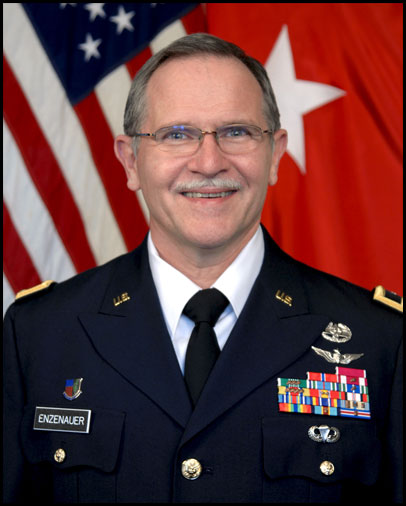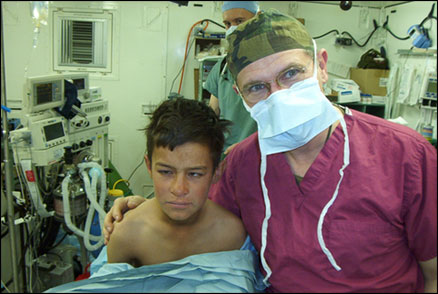Five questions for Robert Enzenauer
Pediatric ophthalmologist, CU School of Medicine, The Children's Hospital

A "normal" week in the life of Robert Enzenauer, M.D., includes treating pediatric patients at The Children's Hospital, where he is professor and chair of ophthalmology, and performing as many as 10 surgeries. At the University of Colorado School of Medicine's ophthalmology department, he's chief of the pediatric division. In the operating room, he's often instructing the residents he supervises. Enzenauer has been with Children's since April 2009, but he's had a long career as a pediatric ophthalmologist and professor.
One day each week, however, his duties take him away from medicine, and he trades in his doctor's coat for an entirely different uniform.
In July of this year, he was promoted to brigadier general, assistant adjutant general for space and missile defense with the Colorado Army National Guard. Colorado has the only National Guard Space Battalion in the United States and is one of only three states with a ground missile defense unit. In his new role, Enzenauer oversees both of the units. On the day we spoke, Enzenauer was trying to make sure the space unit had enough funds to continue its work.
"The space team deploys a combat unit. They literally are special forces for computer geeks," he explains. "There's a team of six guys commanded by a major who downloads satellite imagery, infrared imagery, all kinds of stuff that will let the combat commander know if there are bad guys in certain locations." The team deploys with a satellite dish and there was some question about how that would be funded. So Enzenauer contacted the appropriate parties to ensure money for the pertinent piece of equipment would be available.
"So I'm the guy that they'll call and say, 'Gen. Enzenauer, we're losing this, what can you do to help us out?' "
At other times, you'll find him helping to protect his nation (attending a training conference at the Space and Missile Defense Command in Huntsville, Ala.) or representing his country in a different way (by serving as a one of the grand marshals at this year's Arvada Harvest Festival on the anniversary of 9/11).
— Cynthia Pasquale
1. Following high school, you went to West Point. Why did you choose the academy and how did you get to where you are now?
Vietnam was going and I knew I would have to do something because my draft number was 25. My father was a house painter and he'd never gone to college so he really had no savings and couldn't pay my way for school. I applied to the service academies and I also applied to the Coast Guard Academy and for an ROTC scholarship at the University of Missouri. It was a way to go college. I had also wanted to go to West Point since I was 10 or 11 because of the people who graduated from there. Ulysses S. Grant, Robert E. Lee, Douglas MacArthur, Eisenhower, Bradley, those guys. I thought I wanted to be one of those guys.
 |
| Robert Enzenauer, M.D., here with a patient in Bagram, Afghanistan, estimates he has performed as many as 9,000 eye surgeries. The School of Medicine's chief of pediatric ophthalmology often instructs residents in the operating room. |
Then I went to medical school under a program designed during Vietnam to reward people who did well. I was at the right place at the right time. The war had just ended in '73 and the POWs were returning in '74. I went to med school at the University of Missouri and they really pushed primary care there. I took a pediatric residency at Tripler Army Medical Center in Hawaii. I certainly was proud that I did that and I did a good job, but it became very clear I didn't like the day-to-day life of a general pediatrician. So I practiced pediatrics for two years and said, "To heck with this – I want to be an ophthalmologist." The Army said, "The heck with you, you're a pediatrician and we got you for a long time because of all the training we've given you." So it was then that I volunteered to be a flight surgeon with Fort Campbell, Ky.
I would argue that as a board-certified pediatrician, I was probably the most qualified flight surgeon around. Basically, it's general medicine for aviators, but I also took special training for high altitude and disequilibrium problems.
Then I came to Fitzsimons Army Medical Center in 1986 and did a second residency in ophthalmology. After finishing my residency, I did a fellowship in Toronto. I came back to Fitzsimons intending to stay there for the rest of my life, but then Fitzsimons came down on what they call the BRAC (Base Realignment and Closure) list. When I came back, besides being the chief of ophthalmology, I was also the flight surgeon for Fitzsimons. That's when I met the guys from the Colorado Army National Guard. They had a lot of pilots on flight status but didn't have a flight surgeon, so I would help out and do their flight physicals and fly with them to get my flight time.
I was on the teaching faculty in the Army from '90 to '94 at Fitzsimons, and most of my civilian teaching was in Tennessee from 1998 to 2009.
2. What compelled you to join CU in 2009?
I love it here; I think it's a great place to live and work. I really do believe that The Children's Hospital is in the top 10 (children's hospitals nationally) and will very soon be No. 1 or 2. That's probably the biggest reason. They're putting the resources in it to make it great. Part of my job as head of pediatric ophthalmology is training residents. One of the reasons I'm passionate about academic medicine is that it's very paternalistic. When you graduate a resident to go out to be an ophthalmologist, it really is very similar to your kids graduating from college and starting work. I enjoy teaching the next generation of eye surgeons.
Being a civilian and an Army surgeon is probably closer than you might imagine. The regulations are the same. The advantage of being a military physician is that you don't have to worry about HMOs. If the patient has an ID card, then you take care of them. That's probably my biggest frustration in academic medicine ... all the time my staff has to take to make sure somebody has insurance and I'm on this plan and all that stuff.
3. What are some achievements you are most proud of?
First, I'm very fortunate that I have two, healthy, well-adjusted kids. Secondly, I spent a year in Afghanistan (as a flight surgeon for Colorado Army National Guard Special Forces) for Operation Enduring Freedom 2. They didn't think they'd need an ophthalmologist because the war was over. But there were 5 million mines from when the Russians were there. The hospital at Bagram Air Base didn't have an ophthalmologist, and I was 45 minutes away in Kabul. About once a week, I'd get calls to do emergency eye surgery because I was the only military ophthalmologist in the country. Right before Christmas 2002, two of our soldiers were injured when somebody threw an improvised grenade into their vehicle. Both had shrapnel injuries to their eyes. I operated on both of them and both of them needed second surgeries, one in Germany and one at Walter Reed. I do believe their vision was saved because I was there as a flight surgeon with the Special Forces unit. The next rotation, the Army realized that not having an ophthalmologist was a bad idea and put one in the country.
4. What keeps you occupied during your free time?
When I was in med school, I met my wife and we're still married 31 years later, so I joke that "She married the Army and I married her student loans."
I'm a real history buff and I'm always reading one nonfiction and one fiction book. Right now I'm reading "Hero of the Pacific: The Life of Marine Legend John Basilone."
"Man in the Middle" is a book by Brian Haig, the son of former Secretary of State Alexander Haig and a West Point classmate of mine. What was really flattering was about five years ago at my 30th reunion, he approached me and said, "Bob, my next book has a physician character in it and I wonder if you'd mind if I named him after you." So if you read "Man in the Middle," you'll meet Bob Enzenauer, a CIA physician. I thought it was pretty cool.
5. Being promoted to brigadier general, assistant adjutant general for space and missile defense is a wonderful honor for you, is it not?
I'm fond of it. It really is kind of groundbreaking. This is not a doctor job, and a lot of people say, "Why in the heck has this guy got it?" I was a nuclear engineer out of West Point, and I was commissioned in the Corps of Engineers first. I was deployed twice and I have others skill than the typical Army doctor. There was a Gen. Leonard Wood that I like to relate to. He started as an Army doctor in a contract position in the campaigns against the Indians after the Civil War. He met Teddy Roosevelt and was at the Spanish-American War and ended up as chief of staff of the United States Army, and that's why Fort Leonard Wood, Mo., is named after him. You know a lot of people can make colonel, but to make general is kind of a big deal.
Want to suggest a faculty or staff member for Five Questions? Please e-mail Jay.Dedrick@cu.edu

|